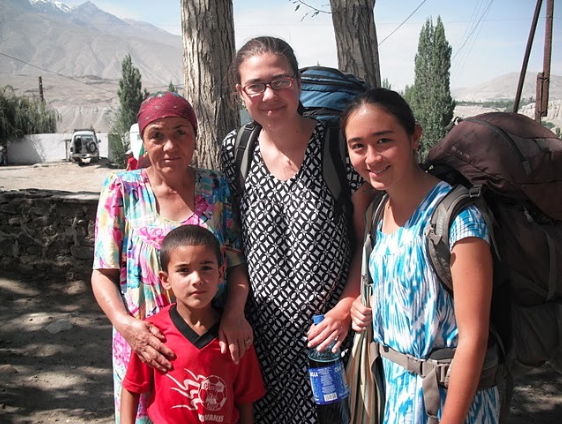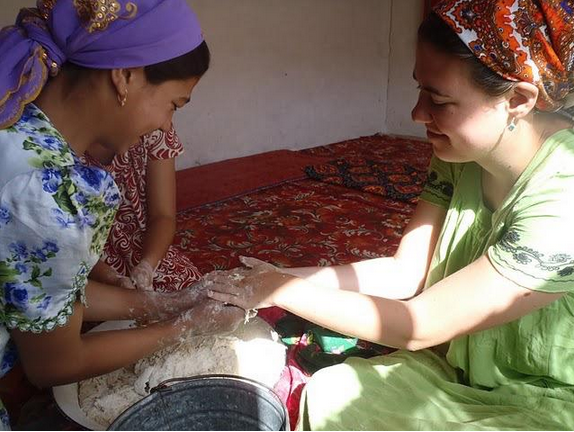Traveling For Free In Tajikistan
by Anna Kellar

Ishkashim is a small market town, population perhaps 1,000, high in Tajikistan’s Pamir mountains, looking across the Amu Darya river to Afghanistan. When my friend Mari and I arrived, the dusty main street seemed empty, blue-painted doors shut. But Mari had been here before, and she thought she remembered where she had stayed. As we turned onto the side street, a sinewy, kerchiefed woman hanging laundry on the line dropped her basket and ran forward, embracing Mari and then me with cold hands.
We ate tough beef and bread in the cool dark of her guest room, while her husband sat on the single throne-like chair, and their grandson played on the rug. Our hosts kept saying over and over, how happy they were to see us, and especially to see Mari. She had left them last year to head deeper into the mountain but hadn’t returned the same way. They had worried about her, hitch-hiking on her own. That she had come back safe, a year later, was a matter of great relief. Of course we would stay the night with them.
Mari had warned me that no one would accept money in return for hospitality. The only option was to bring something to give as a gift. Tea would be welcome, maybe gum for the children. Last year, she had left a copy of her old US high school senior picture, with her address on the back. That photo had spent the year on the wall in that Ishkashim house, where Mari and a magazine clipping of Leonardo DiCaprio where the only decorations.
When we left the next day — this time with a promise to call when we were back in the capital — we had the name of a relative who would host us in the next village. In Vrang, a gang of children came out to stare at two women walking with large backpacks, and we asked directions to Gulnora’s house. They brought us to a house with a large apricot orchard, and Gulnora was found — but she didn’t have a relative in Ishkashim. We must be looking for the village’s other Gulnora, she said. But now that we were there, we must stay with her family. They wouldn’t take no for an answer.
The hospitality even worked in cities. In Kulyab, we tried to find the UNDP guesthouse that my 5-year-old guidebook claimed would rent rooms to tourists. I’d had a former UN employee in my Farsi class freshman year, but my ability to say the full title of the ‘United Nations Development Program’ did not impress the taxi driver. He dumped us at the door of a compound on the outskirts of the city, which, it turned out, had once belonged to the OSCE — our taxi-driver understood the ‘foreign compound’ part at least — but now belonged to a private family. Rather than turning us away, though, the family invited us in for watermelon, hot showers and a place to stay, before hiring us a ride to the UNDP in the morning. We were fortunate; the UNDP didn’t have a guesthouse anyway.
I was a student on a fellowship, most of which had gone towards a plane ticket. I was also used to thinking of myself, in America, as lower-income. But I had never experienced real material deprivation in the way of many of the people who fed and housed me. I was uncomfortable taking from them, that I couldn’t treat these encounters as a capitalist transaction of money for goods and services. The problem was, I couldn’t shake the idea that it was a transaction, with new rules that I didn’t understand. What if I was failing to reciprocate? What if I was supposed to refuse some of the offers?
So I started paying attention. What did my hosts ask me for? Mostly it was for stories about life in America. It was little enough for me to give, especially since, as a researcher on post-conflict politics, I asked questions about sensitive topics all the time. Sometimes, though, that openness to social interaction was a high price to pay. What I lost by not paying for a hotel was anonymity, privacy, the ability to say, No, thanks, I’d like to read my book or talk in English, and not struggle once again to explain in a second language that “Yes, salaries are higher in America, but so are costs,” “Yes, America has a black president,” “No, I’m not married, and not planning on it anytime soon.”
Those awkward exchanges were outweighed, though by the conversations about family, aspirations, frustrations. I stayed up late one night comparing stories about student life with Lola, back home from her first year at university. Another woman showed me the boulder where she had sheltered from bullets when her daughter went into labor during the middle of a battle. Once I turned up uninvited to a wedding, and was promptly dragged, in a borrowed dress, to dance in front of 200 people. Four years later, these people, these conversations are fresh in my mind, and I can remember every night, every host, with clarity.

As we traveled across the country, the warmest welcome came from those who had the least. A shepherd shared his one-room cottage and fed us tea at 4 AM on a very cold morning. A family baked an extra round of bread in the week because I’d expressed an interest in how the oven worked. Hitch-hiking is the norm across Tajikistan and passengers crammed in shared taxis bring out fruit to share on the long, bumpy journeys. An ethnic Kyrgyz family gave us a ride in their jeep and a share of their apricots, despite the fact that they shared not a single word in a common language.
I came to realize that travel — to me, an adventure and a luxury — was, to many Tajiks, a hardship and misfortune. Hospitality is not merely generosity; the Tajik word Mehmondusti literally means friendship to guests. Travelers, no matter their origin, were people to be helped by those fortunate enough to have a roof over their heads or a better set of wheels.
Several NGOs are working to increase tourist facilities in Tajikistan, including training women to cook and clean to Western tastes. Once trained, these home-stay locations go on a list for tourists who are, for now, mostly extreme-travel enthusiasts biking across Asia. A night’s stay cost $10: hardly exorbitant, but a significant source of income for a rural Tajik family. This is the beginning of a shift in cultural norms, and staying in one official home-stay, I felt torn between my longing for friendship and the knowledge that tourism is one of the only things that will bring income to the people I had come to care about.
I still feel a debt, financial but mostly karmic, toward my Tajik hosts. I left my home address and contact information with everyone I met. I told my parents that if a Tajik stranger showed up at the door, they should put the kettle on. No one ever has; but my door remains open.
This story is part of our Travel Month series.
Anna Kellar lives in Maine, where she works on campaign finance reform and dreams about Tajik cherries. Her writing has been published in Asian Affairs.
Support The Billfold
The Billfold continues to exist thanks to support from our readers. Help us continue to do our work by making a monthly pledge on Patreon or a one-time-only contribution through PayPal.
Comments